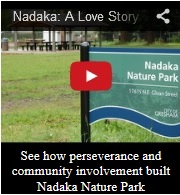Youth volunteers tend Nadaka Nature Park as city parks funding woes take root
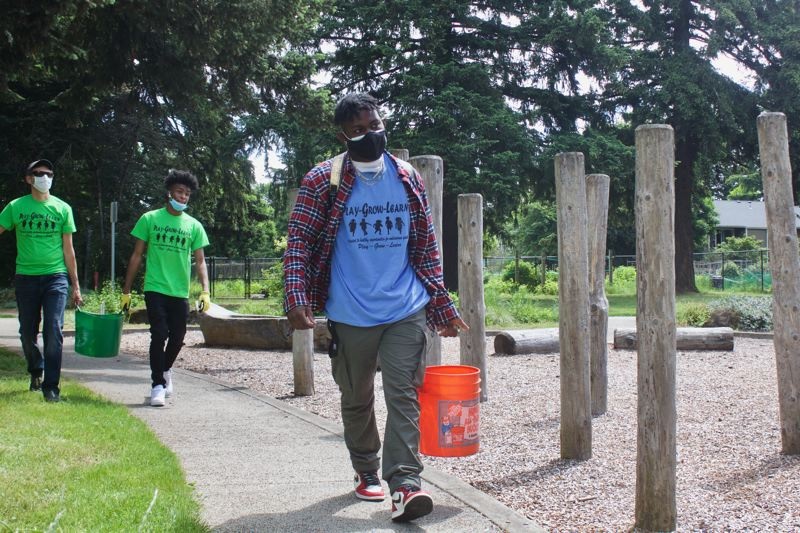
PMG PHOTO: CHRISTOPHER KEIZUR - Germaine Flentroy Jr. lugs a bucket of water across Nadaka Nature Park while helping maintain the greenspace.
Source: Gresham Outlook, Jun 22, 2020
By Christopher Keizur
A group of youth made a troubling discovery one afternoon while volunteering at Nadaka Nature Park.
Vandals had ripped out a young tree planted to provide shade in the Nadaka meadow for a popular bench among those seeking a quiet way to spend the afternoon. The tree, which had been planted earlier this spring, had been carelessly tossed to the side.
So the youth got to work. They re-dug a hole and got the tree back upright. Then they lugged water across the park to give the tree the best chance for survival. The work in Nadaka is just one way youth counselors with nonprofit Play Grow Learn are giving back to their community.
"I'm so grateful you all are helping maintain this park, because the city isn't able to," said Lee Dayfield, the creative force behind Nadaka.
|
Their support comes at a crucial time for one of the most unique parks in Gresham. Funding officially dried up at Nadaka, 17615 N.E. Glisan St., on June 1 — marking a major shift in what was once touted as the model for future parks in the city. What made it special was the ongoing bevy of activities happening within the space. There were cleanups, partnerships with schools, bird walks and workshops on native plants and pollinators. Nadaka hosted an annual free community festival that celebrated Rockwood's diversity, and employed a group of "Park Ambassadors," who served as the face of Nadaka — educating visitors and ensuring the park stayed safe and clean. |
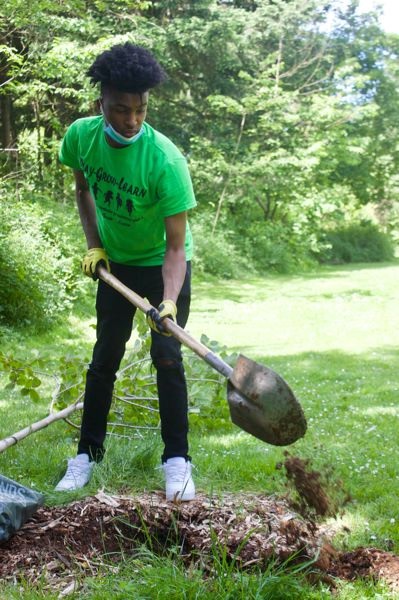 PMG PHOTO: CHRISTOPHER KEIZUR - Nick Johnson, 20, lives only a few blocks away from Nadaka Nature Park. |
All of it was made possible by chasing grants.
"We knew raising funds this way was not sustainable," Dayfield said. "We hoped the city of Gresham would fill in the gaps, but that didn't happen."
City staff, who are overstretched among the 56 parks with more than 300 acres of space, can only mow the grass and empty the trash cans at Nadaka. Funding is also a major issue in Gresham, leading many voices to call for innovative new ways to raise money for parks.
A new coalition has been meeting virtually and is outlining a formal plan. So far, more than a dozen organizations have joined, including Play Grow Learn. It's a diverse mix of people that are all united in seeking a better way to reinvest in the parks system.
Several short and long-term funding ideas have been earmarked, though nothing is at the stage to make a formal pitch to the city. So in the meantime, it will be groups like the Play Grow Learn youth who do the majority of the work.
"We are doing the stuff that otherwise isn't going to get done," said Anthony Bradley, executive director of Play Grow Learn. "We are showing what can be done at our parks on a small budget."
Problems at Nadaka
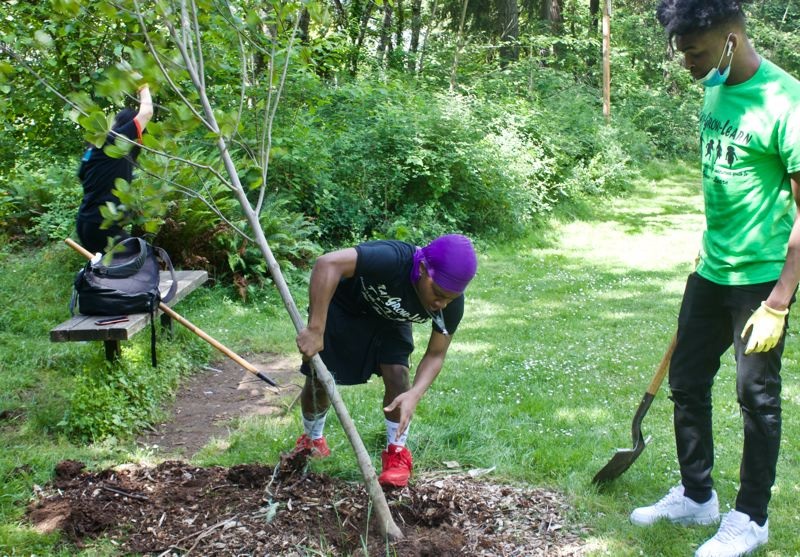
PMG PHOTO: CHRISTOPHER KEIZUR - Play Grow Learn youth volunteers replant a tree in Nadaka Nature Park that had been ripped out by vandals.
Nineteen-year-old Rico Garland had never been to Nadaka before he found himself removing invasive ivy from the wooded-trail system as part of Play Grow Learn's Days at Nadaka.
But soon the East Portland teen fell in love with the park.
"It's great to help out the community," Garland said. "This place is so beautiful."
Nadaka is a 10-acre property acquired from the Camp Fire Columbia organization in 1995. It was purchased thanks to Gresham voters passing an open-spaces bond measure in 1990.
In spring 2015, Nadaka celebrated an opening to the public, featuring wooden play structures, a community garden, restroom, picnic shelter, walking loop and public art.
"All of this is because of the hard work of community members," Dayfield said. "We all volunteered because we love this place."
Dayfield poured a lot of herself into supporting Nadaka. She spearheaded the charge to transform her dream park into a reality, overcoming red tape and bureaucracy to found Friends of Nadaka to secure grants and other funding.
For many years the Columbia Slough Watershed Council, a Portland-based organization, had supported the Gresham park. But with changes to the board and executive director, the watershed council decided to focus on other projects.
That caused the funding to run out at the beginning of this month, leaving a beautiful green space with nothing to do. There is some hope for the park — nonprofit Outgrowing Hunger has stepped in as the new fiscal agent for Friends of Nadaka, and was able to capture a $25,000 grant from the East Multnomah Soil & Water Conservation District. That grant was secured thanks to a funding match from the city.
But still Dayfield, and other members of the parks coalition, are seeking more permanent answers for the entire community.
The problems began two decades ago with a pair of ballot measures passed in Gresham that hamstrung the city's ability to fund parks. The votes set a permanent property tax that was the second lowest in the state.
|
The fallout was immediate In 1990, Gresham's property taxes paid for 100% of police and fire services. Now, those taxes are only able to foot 40% of those expenses. As a result the city had to get creative in filling in the gaps. With the priority being safety, police and fire get the lion's share, leaving parks to wither. |
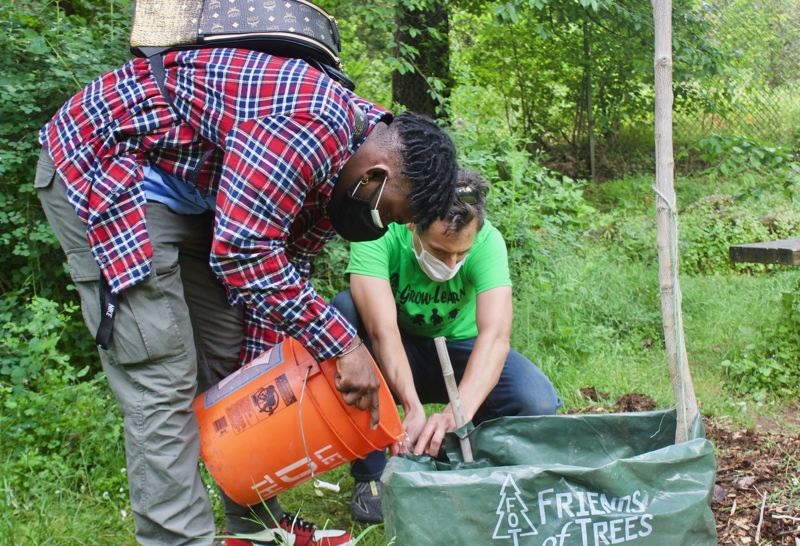 PMG PHOTO: CHRISTOPHER KEIZUR - Germain Flentroy Jr. and Jim Labbe fill a device with water that will give a replanted tree the best chance at survival. |
Ideas have been bandied about by the parks coalition.
One long-term answer would be to look into forming a parks district, which has the power to construct, reconstruct, alter, enlarge, operate and maintain lakes, parks, recreation grounds and buildings; acquire necessary lands; and to call necessary elections after being formed. It isn't easy to implement a parks district, necessitating city leadership lessening its control over greenspaces, a feasibility study and public vote.
Other solutions have been a new parks utility fee; increasing the existing Police-Fire-Parks fee that was enacted in 2012; or vying for an Operations Levy/Bond Measure, that would also collect from property taxes.
Perhaps the most immediate proposal is participatory budgeting, which involves the community in choosing how to spend funds.
The city could start small, setting aside $100,000 in the first year. Different groups would pitch proposals on how to spend that pot, eventually leading to a community vote on what to fund. The city could set up guidelines that would shape what sort of proposals could be considered, but otherwise it places the onus in the hands of the community to grow and develop parks.
If participatory budgeting proved to be successful, it could be expanded.
"We could scale up and better fund all of our parks," said Jim Labbe, a former urban conservationist with the Audubon Society of Portland.
Lending a hand
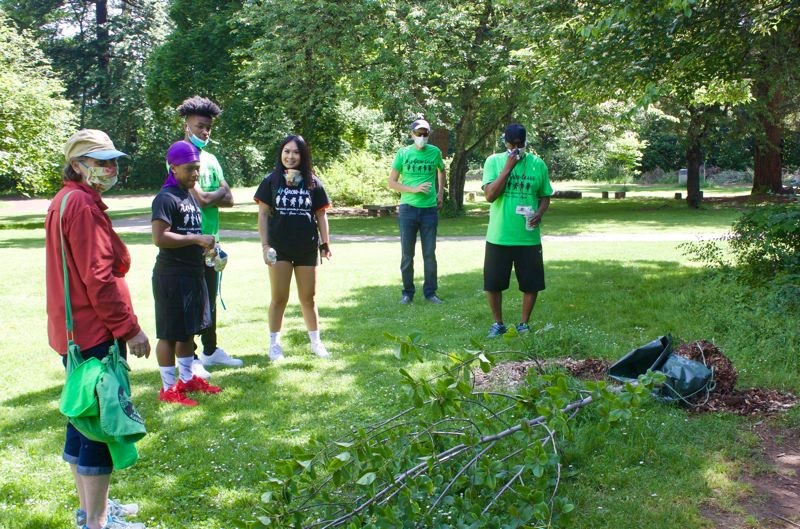
PMG PHOTO: CHRISTOPHER KEIZUR - A group of volunteers spent an afternoon replanting a tree that had been ripped out of the ground.
Germaine Flentroy loves to visit Nadaka Nature Park with his youngest children, ages 4, 6 and 9.
They fondly refer to it as "the water park" because one of their favorite activities is playing with a water spigot by the climbing structure. When the weather is nice the Flentroys will enjoy a picnic in the grass, scratching that camping itch put on hold due to restrictions from the COVID-19 pandemic.
So for Flentroy, program coordinator with Play Grow Learn, setting up a program to maintain the greenspace was a no-brainer.
"We want to be involved in our parks beyond having conversations," he said. "We have to do our part to represent and teach kids of color."
Normally this time of the year, the youth involved with Play Grow Learn would be helming camps for homeless and foster children as counselors. With the pandemic, the nonprofit organization based in Rockwood pivoted to food boxes for underserved families and the park cleanups. It is the youth who would have been camp counselors that have dived into their new roles.
Every week, 8-10 volunteers spend a couple of hours weeding, picking up trash, and undoing damage done by vandals. They also water plants in need of attention. The youth are paid by Play Grow Learn for their time in the park, and it is being used as an opportunity to teach them and hopefully foster a love for horticulture.
Eventually, when COVID-19 restrictions loosen, Play Grow Learn will have a field trip day where it brings the younger campers to Nadaka for an afternoon of fun.
And soon another group of teens will begin helping at Nadaka. Rosemary Anderson High School's Summer Works Group will be doing forest restoration at the park.
"These types of programs send a message to the city that people care about our parks," Labbe said.
Until Gresham is able to figure out funding, it will be up to volunteers to continue caring for their parks.
"Nature is for all," Flentroy said. "It's a safe place where you can get healed."
This story first appeared in The Outlook. Support community newspapers. Subscribe at http://savinglocalnews.com













